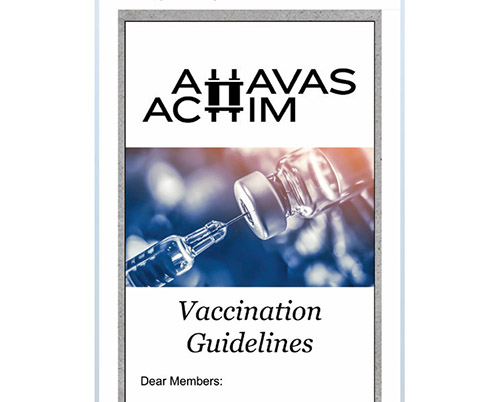

One of the principles we learn from Tanach and from Jewish history is that the right person, at the right time, can make an enormous difference.
This has proven true in the Middlesex County Jewish community as it responds to the current measles outbreak in New York, with particular concentrations in Williamsburg and Monsey and a few cases throughout New Jersey.
In early May, Congregation Ahavas Achim in Highland Park sent an email to all members, associates and supporters, signed by Rabbi Steven Miodownik, shul president Josh Ostrin and a shul member medical advisor, with a strong and unequivocal message about vaccinations. The email referenced “the measles outbreak which has affected some nearby communities,” and presented the shul’s guidelines for vaccinations, stating that “everyone must be up to date with all recommended vaccinations” and “all children should be up to date with all vaccines.”
The email from the shul asserted a “religious obligation to be properly vaccinated,” based on two principles: “Do not stand over the blood of your fellow,” an imperative to do all we can to protect the lives around us; and “You must love your fellow as yourself,” an imperative to be more cautious with the lives of others than one might be with one’s own.
Shortly thereafter, Congregation Ohr Torah in Edison posted a “Statement on Vaccinations” signed by Rabbi Yaakov Luban, Rabbi Sariel Malitzky and shul president Jeffrey Klein on the top of their website. The statement stated that “Congregation Ohr Torah strongly supports vaccination and encourages all parents to vaccinate their children on the timetable recommended by their pediatrician and the CDC,” adding, “To protect the health of the community, we request that individuals who have not been properly vaccinated against measles refrain from entering the shul.”
Another community institution that adopted a strong stance on vaccinations, in the summer of 2018, is the Rabbi Pesach Raymon Yeshiva (RPRY) in Edison. RPRY’s Director of Admissions Shoshana Madsen shared that RRPY’s school applications state very clearly that all students must be vaccinated and parents must acknowledge that before they submit the application. Any requests for medical exemptions are forwarded to the Vaccine Preventable Disease Program of the NJ Department of Health, which assesses each request and decides whether or not to approve it.
One community member who strongly supported RPRY’s new vaccination policy is the same person who served as the medical advisor for Ahavas Achim’s policy—Elliot Frank, MD, the medical director for quality and outcomes at the Jersey Shore University Medical Center and a clinical professor of medicine at the Rutgers University Robert Wood Johnson Medical School. He also serves as a professor of medicine at the Hackensack Meridian Health School of Medicine at Seton Hall University.
It is believed that Ahavas Achim’s policy inspired the development of the policy at Congregation Ohr Torah. And it may have prompted other shuls to act—the Khal Chasidim Shteibel in Highland Park adopted a similar policy and, as one board member reported, a policy is now under discussion as well at Congregation Ohav Emeth in Highland Park.
One of the reasons that Dr. Frank is so passionate about the importance of vaccinations is because he knows the history of measles in the United States. He reports that, “Prior to the introduction of the vaccine there were 3-4 million cases of measles in the U.S. annually and 48,000 hospitalizations. Four to five thousand children developed chronic disability due to measles encephalitis and there were anywhere between 400-500 deaths per year.”
Dr. Frank also knows how extremely contagious measles can be. He stated that, “Infectious droplets from an infected individual remain airborne for up to two hours; therefore, measles can be transmitted in public spaces even in the absence of direct person-to-person contact. And measles can be transmitted from an infected individual for up to four days prior to the appearance of the rash.”
He shared one recent story he knew about, of a patient in a New Jersey hospital who had unusual symptoms that puzzled the medical residents. The patient was initially placed on a regular floor, but within an hour, a more senior medical officer determined that the patient had the measles and instructed that he be placed in isolation. In the short time the patient was on a regular hospital floor, a medical professional on the unit contracted the measles—even though he was working on the opposite side of the floor.
Dr. Frank pointed out that people who voluntarily go without vaccines put particular categories of people at greater risk—newborn babies, who are generally not vaccinated until they are 1 year old; children on immunosuppressive medications; children being treated for cancer; and the elderly, who may lose immunity as they age.
Dr. Frank suggested that it is the obligation of all observant Jews to speak out about the importance of vaccinations. And they must counter the dangerous untruths of opponents of vaccinations as they are, as he terms it, “rodephs” who are pursuing the potential harm and death of fellow Jews.
By Harry Glazer
�













